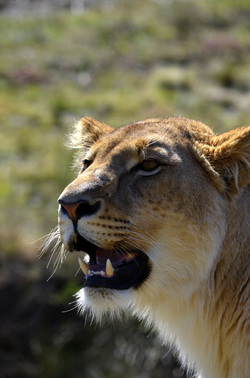
Small livestock farmers have complained that their livelihoods are threatened by stock losses caused by predators, mainly caracals and jackals. They say that their only defence is to launch a predator extermination program..
Conservationist respond by pointing out:-
1. That the farmers’ refusal to employ herders or to kraal their animals at night is the real cause of stock losses. Poor animal husbandry is to blame. Farmers throw their sheep out into the mouths of predators, leaving them unprotected day and night out in the veld.
2. Extermination of wildlife will not solve the farmers’ problems. These methods have all been tried before and have failed. The report by Professor Bothma, commissioned by Cape Nature, examined the infamous “Oranjejag” where a similar predator elimination campaign was conducted in the Free State. That slaughter by hunt clubs over a period of years killed 87,000+ wild animals - of which more than 60,000 were harmless non-target species, such as Cape Foxes.
3. Bothma points out that more jackals and caracals were killed in the last year of the Orangjejag than ever before. In other words, the mass slaughter certainly devastated wildlife populations - but did not eliminate the clever predators.
Unfortunately, the Bothma Report was only completed after government had already decided to give in to the farmers’ demands. Citing food security as an overriding factor, government pressed Cape Nature to sign a Protocol with farmers’ representatives, permitting livestock farmers to form district-wide hunt clubs and to use gin traps, guns, poison and even helicopters to assault the province’s predators.
One would expect that the Bothma Report would have knocked out the Protocol and saved our wildlife from persecution but politicians everywhere are more interested in votes that in science.
If government does not care about the science, perhaps it will care about losing votes. South Africans who care about their wildlife heritage should talk to their MP’s.
(There is indeed a threat to food security in S.A. but it is not caused by jackal and caracals. In my humble opinion it is caused instead by political ideology and populist demand - the national government’s Land Reform Programme.)
Our wildlife heritage is under threat. Government intends to implement the Protocol notwithstanding the scientific evidence that this will impact biodiversity out of all proportion to any temporary respite for farmers.
The message from Professor Bothma is that both sides must compromise if we are to reach practical solutions. The conservationists publish horror photos of the injuries caused to wild animals by gin traps. The farmers respond with horror photos of stock animals attacked by predators, including gruesome pictures of calves being eaten alive as they are being born.
Gin traps.
If we had been given the time to question the farmers’ representatives more closely, I would have put the following ideas to them:-
1. We ban the manufacture, import, sale, possession and use of all leg-hold traps, soft and hard except where special permits have been issued by Cape Nature.
2. Farmers whose particular conditions require the use of gin traps must apply for permits to Cape Nature, who will only issue permits AS A LAST RESORT for the use of approved traps and after imposing strict conditions on their use. Permit restrictions might require the use of cell phone alarm systems so that the farmer knows instantly when the trap has closed.
Herders.
1. Farmers undertake to kraal their sheep at night and/or employ herders wherever possible and employ other defensive non-lethal methods of reducing stock losses. Margins in farming have shrunk and more active management is now necessary. Throwing sheep out in to the veld to look after themselves is outmoded.
2. If rigid labour laws are preventing farmers from employing herders then some special dispensation for herders is needed. Perhaps prison labour could be used, thereby reducing overcrowding in prisons and relieving the farmer from the burden of paying wages. In school holidays perhaps children could be allowed to earn a little money herding.
Gin Trap Destruction Festivals?
With good faith on both sides, this system could work. Farmers would avoid the damaging results of a confrontation with their own consumers and no doubt there are media and public relations opportunities in publicly destroying old gin traps. No doubt the big retailers would participate in enhancing the image of farming in SA.
